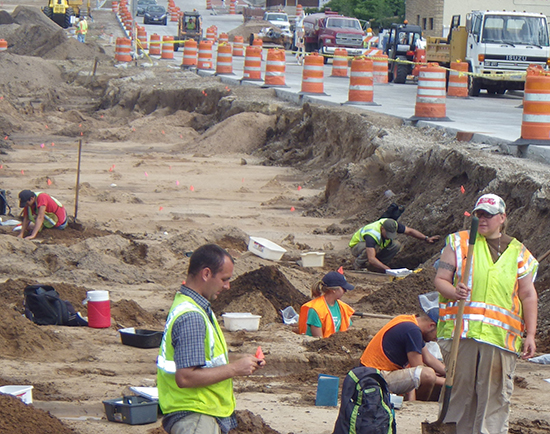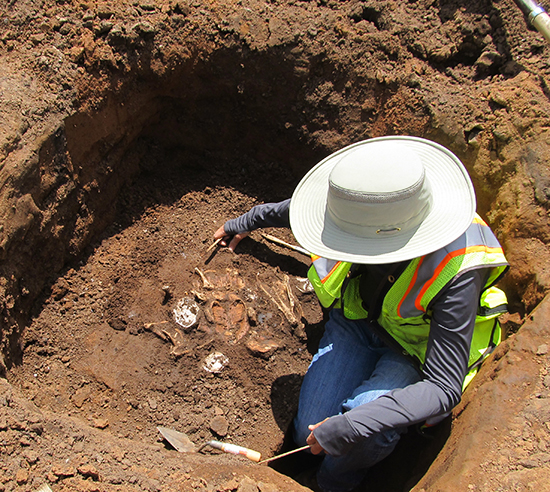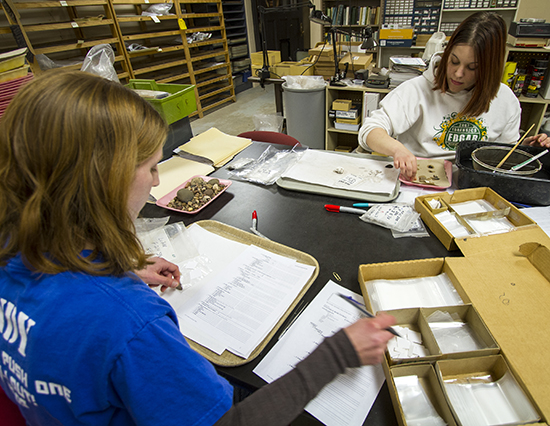Posted 4:10 p.m. Tuesday, Jan. 29, 2013

For MVAC’s commitment and dedication to the Hwy. 35 reconstruction project, the team was recognized with the 2012 Wisconsin Department of Transportation Tribal Excellence Award.
 [/caption]When the UW-La Crosse Mississippi Valley Archaeology Center archaeologists encountered an ancient Oneota village in the middle of an Onalaska highway reconstruction project, they knew they had a lot of work and collaboration ahead of them.
For MVAC’s commitment and dedication to the project, the team was recognized with the 2012 Wisconsin Department of Transportation Tribal Excellence Award. The award is for providing exemplary contributions and services to building and enhancing partnerships with WisDOT and Wisconsin Tribal communities.
MVAC Archaeologist Kathy Stevenson recalls catching the first glimpse of an ancient village buried under Hwy. 35 in Onalaska. It was summer 2011, and building demolition for a large road construction project had begun. Amid the rubble, her team of researchers zoned in on some dark soil where a building foundation had just been removed.
[caption id="attachment_19747" align="aligncenter" width="550" caption="Kathy Stevenson, projects director for MVAC, excavates a cluster of animal bone — turtle shell, freshwater mussel, bird bones — at the bottom of a pit feature. The team would excavate or watch as contractors dug to see if something was exposed. They would mark spots, map them out and organize their finds accordingly."]
[/caption]When the UW-La Crosse Mississippi Valley Archaeology Center archaeologists encountered an ancient Oneota village in the middle of an Onalaska highway reconstruction project, they knew they had a lot of work and collaboration ahead of them.
For MVAC’s commitment and dedication to the project, the team was recognized with the 2012 Wisconsin Department of Transportation Tribal Excellence Award. The award is for providing exemplary contributions and services to building and enhancing partnerships with WisDOT and Wisconsin Tribal communities.
MVAC Archaeologist Kathy Stevenson recalls catching the first glimpse of an ancient village buried under Hwy. 35 in Onalaska. It was summer 2011, and building demolition for a large road construction project had begun. Amid the rubble, her team of researchers zoned in on some dark soil where a building foundation had just been removed.
[caption id="attachment_19747" align="aligncenter" width="550" caption="Kathy Stevenson, projects director for MVAC, excavates a cluster of animal bone — turtle shell, freshwater mussel, bird bones — at the bottom of a pit feature. The team would excavate or watch as contractors dug to see if something was exposed. They would mark spots, map them out and organize their finds accordingly."] [/caption]In a time long before garbage trucks, these dark circles in the earth were the remains of 400-700 year-old garbage pits or “pit features” — spots where former cultures threw their garbage. The seemingly mundane find to a layperson was a treasure trove to her team of archeologists — “garbage” tells them a lot about a culture’s everyday life from the crops they grew to the tools they made.
They found a total of 500 pit features, as well as human remains in 30 locations along five city blocks. The information they’ve collected will contribute to understanding of the Oneota culture, which flourished in the La Crosse and Onalaska area from about A.D. 1300 to 1600.
“The ramifications were huge and so were the responsibilities — especially when dealing with human remains, where there is a strict process that needs to be followed,” says Stevenson.
[caption id="attachment_19750" align="aligncenter" width="550" caption="Excavation is only a small part of the archaeologist’s job. Now MVAC archeologists and students who worked on the project spend their days cleaning and cataloging artifacts found at the site. Here student workers clean and catalog artifacts. "]
[/caption]In a time long before garbage trucks, these dark circles in the earth were the remains of 400-700 year-old garbage pits or “pit features” — spots where former cultures threw their garbage. The seemingly mundane find to a layperson was a treasure trove to her team of archeologists — “garbage” tells them a lot about a culture’s everyday life from the crops they grew to the tools they made.
They found a total of 500 pit features, as well as human remains in 30 locations along five city blocks. The information they’ve collected will contribute to understanding of the Oneota culture, which flourished in the La Crosse and Onalaska area from about A.D. 1300 to 1600.
“The ramifications were huge and so were the responsibilities — especially when dealing with human remains, where there is a strict process that needs to be followed,” says Stevenson.
[caption id="attachment_19750" align="aligncenter" width="550" caption="Excavation is only a small part of the archaeologist’s job. Now MVAC archeologists and students who worked on the project spend their days cleaning and cataloging artifacts found at the site. Here student workers clean and catalog artifacts. "] [/caption]Stevenson says communication — every day and sometimes multiple times each day — was key. They had to work with multiple stakeholders in the project including the DOT, Federal Highway Administration, Wisconsin Historical Society, City of Onalaska, Ho-Chunk Nation and construction contractors.
“When you have a road dug up in the middle of the city, you need to keep moving dirt,” says Chris Dahl, projects leader with the Department of Transportation. “I was fearful going into the project that it would be held up, but once I saw how the MVAC team got going on things — putting in long days and long hours — I saw they wanted to work with us to get the project done. They understood the time constraints we were dealing with.”
[/caption]Stevenson says communication — every day and sometimes multiple times each day — was key. They had to work with multiple stakeholders in the project including the DOT, Federal Highway Administration, Wisconsin Historical Society, City of Onalaska, Ho-Chunk Nation and construction contractors.
“When you have a road dug up in the middle of the city, you need to keep moving dirt,” says Chris Dahl, projects leader with the Department of Transportation. “I was fearful going into the project that it would be held up, but once I saw how the MVAC team got going on things — putting in long days and long hours — I saw they wanted to work with us to get the project done. They understood the time constraints we were dealing with.”